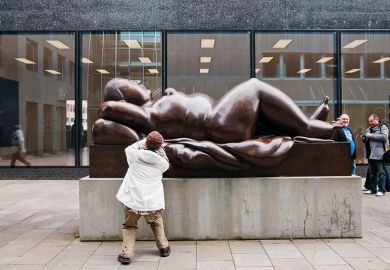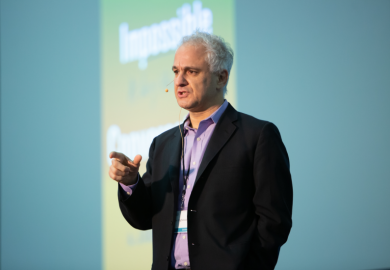Will the 'consciousness boom' fade away? asks David Papineau.
For most of this century, consciousness has been a dirty word in academic circles. To the founding fathers of experimental psychology, for example, consciousness reeked of the dark old days of introspection and subjectivity. To be interested in consciousness was to be against the rigorous study of reinforcement schedules that would make psychology scientific. Similarly, philosophers as far apart as Wittgenstein and Quine spoke with one mid-century voice when they denied any important philosophical role to consciousness. For them, consciousness was linked with the "myth of the given" and with outmoded attempts to construct the world out of "sense-data".
Recently, however, the climate has changed. Consciousness is now all the rage. Not that the psychologists want to go back to introspectionism, or the philosophers to sense-data. But now that these old enemies have finally been vanquished, the issue of consciousness is no longer bound up with the traditional battles. Even the most scientific psychologists and the most hard-headed philosophers are now allowed to talk about consciousness, and an awful lot do.
Many of these thinkers aspire to "theories of consciousness". Theories of this kind aim to figure out exactly which activities in the brain are associated with conscious experience. A number of suggestions have proved popular. One of the earliest tied consciousness to higher-order thought, to the ability of a system to represent its own first-order representations to itself. A currently more fashionable alternative links consciousness with informationally rich action-guiding states like visual perception. Yet other accounts seek to ground consciousness in the physiological details, rather than in abstract categories like representation or information. For example, Francis Crick, co-discoverer of the structure of DNA, and his collaborator, psychologist Christof Koch, link visual consciousness with 40-Hertz oscillations in neuronal firing in the visual cortex (supported by Roger Penrose and Stuart Hameroff).
An initial question about any such theory is whether it tallies with the empirical facts. Are the theory's favoured brain activities present in all and only those cases where humans feel conscious? At this level there is plenty of room for argument, for human consciousness has many facets. However, a rather deeper worry has been bubbling beneath the surface of this empirical debate. Even if we can draw a circle around just those brain activities that go with consciousness, will not an essential worry still remain? Knowing when consciousness arises will not necessarily tell us why it does. As the American philosopher Joseph Levine has put it, there will always remain an "explanatory gap" between descriptions of brain function and the existence of consciousness.
David Chalmers's widely-read The Conscious Mind (1996) has done much to bring this issue to the fore. He calls the explanatory gap the "hard problem". To make the point clear, Chalmers distinguishes between two aspects of mental states. The "psychological" aspect of a mental state is its causal role, the way it interacts with other states in directing behaviour. The "phenomenal" aspect is the conscious feeling, the what-it-is-like that we experience directly in our own case. The "easy" problem of consciousness is to account for the psychological properties of conscious states in physical terms. Standard theories of consciousness aim to do this by showing how the relevant causal roles are realised in our brains. But this leaves the "hard" problem untouched. Why are there also phenomenal properties? Why should it feel as it does, or indeed like anything at all, to be a system that has higher-order representations of its own representations, or whose neurons oscillate at 40 Hertz?
Explaining Consciousness collects in book form a series of articles on the "hard problem" originally published in the Journal of Consciousness Studies. Chalmers kicks off with a short summary of his position, followed by 26 responses, to which he then provides detailed replies. The volume is determinedly interdisciplinary, with a fair sprinkling of physicists and physiologists, alongside philosophers and psychologists of all denominations. The quality of the contributions is mixed, but this is a useful survey of the kind of work that has been spawned by the boom in consciousness studies.
Chalmers's solution to the hard problem is to postulate conscious experience as an extra-fundamental component of reality. He draws an analogy with the 19th century recognition of electromagnetism as a fundamental force. At one time it had been hoped that electromagnetism could be explained in terms of more basic mechanical processes. But James Clerk Maxwell and his contemporaries realised that this was impossible, and so added electromagnetism to the list of basic elements of reality. Chalmers urges exactly the same move with respect to consciousness. We need to recognise a new basic feature of nature - phenomenal experience - if we are to accommodate consciousness.
Not everybody agrees about the need for this inflationary move. A number of the commentators in Explaining Consciousness see nothing wrong with a reductionist identification of consciousness with brain processes. Why think anything more is needed, they ask, once we have a theory that identifies the physical nature of conscious experiences? From the perspective of this reductionist view, the hard problem is essentially a confusion. Chalmers presupposes what he needs to show, the reductionists complain, when he assumes that conscious experience is distinct from any physical process.
It is worth being clear that reduction does not mean elimination. Reductionists accept that consciousness exists. They merely want to identify it with something physical. Reductionists, as well as Chalmers, can find a good model in 19th century physics. Where Chalmers appeals to electromagnetism, they can appeal to heat. In the case of heat, physics went the other way. Instead of adding heat to the fundamental components of reality, physicists did manage to explain it in terms of a more basic mechanical process, namely molecular motion. Note that this did not eliminate heat from our world view, in the way that we have eliminated animal spirits, say. We still think heat exists, we just do not think of it as something extra to molecular motion, in the way that electromagnetic fields are extra. Similarly with consciousness, urge the reductionists. Consciousness exists, but not as something extra to brain activity.
Eliminativist views are not entirely unknown in the philosophy of psychology. For example, Paul Churchland has for many years argued that propositional attitudes, such as beliefs and desires, deserve to be eliminated from our ontology. In his view, these states are like animal spirits, theoretical figments that will in time be unmasked by the true science of cognition. Churchland has developed this argument in various essays over the years and the best are reprinted in his and his wife's collection, On the Contrary.
However, eliminativism about beliefs and desires is one thing, eliminativism about consciousness another. It would take philosophical chutzpah to deny that human beings are ever conscious. Daniel Dennett has flirted with this extreme position over the years, and does so once more in his contribution to the Shear volume, but not surprisingly it has few other takers. Certainly the Churchlands do not want to extend their eliminativism about beliefs and desires to consciousness itself, and in the middle section of their collection they reprint a number of pieces developing the general reductionist line that consciousness will be quite adequately explained once we understand how the brain works. According to the Churchlands, this understanding will be built from the physiological bottom up, so to speak, by appreciating how the brain is organised as an interconnected system of neural networks. This enthusiasm for neural networks is also evident in the final section of their collection, when Paul Churchland uses the network idea to illuminate a number of issues from the philosophy of science, such as the theory-ladenness of perception and the incommensurability of theories.
On consciousness itself, I should confess that my sympathies are with reductionists like the Churchlands rather than with Chalmers. Despite its initial attractions, Chalmers's dualist thesis that consciousness is an extra ingredient of reality seems to create as many problems as it solves. For one thing, it threatens to render the conscious realm causally impotent, since it would fly in the face of modern science to allow that non-physical influences can affect the physical operation of body parts like nerves and muscles. Moreover, it is not clear that Chalmers's line helps much with the hard problem anyway. If you are puzzled about why it feels a certain way for your brain to be in a given physical state, then why is it an advance to be told that your brain contains some further ingredient? The question of why this extra ingredient feels a certain way would still seem to remain. Chalmers is not unaware of these difficulties, and he has interesting things to say about them in his final remarks, but the resulting complications only add to the attractions of the ontologically simpler reductionist option.
The reductionists in the Shear volume, however, seem to me to muff their chance. Even if reductionism is right and feelings are nothing but brain processes, it cannot be denied that feelings seem very different. A convincing reductionism needs to account for this. It needs to explain why dualism seems so intuitively plausible. However, none of the reductionists in the Shear volume make much of a fist of this. Even those such as Valerie Hardcastle and Thomas W. Clark, who do stop to ask why mind-brain identity is so much harder to stomach than other reductive claims, tend to answer in broadly sociological terms, referring to the theoretical commitments of different philosophical schools. This seems to underestimate the intuitive pull of dualism and to fail to explain why dualism is so common among ordinary people untainted by philosophical theory.
Personally, I think the pull of dualism derives from the special way we think about conscious experience. In Chalmers's terminology, we become confused by the radical difference between "phenomenal" concepts, which invoke the what-it-is-likeness of experience, and "psychological" concepts, which allude to causal roles. Reductionists must hold that these two kinds of concepts in fact refer to the same processes, in the same way as "heat" and "molecular motion" refer to the same phenomenon. But at the same time they should recognise that the special structure of our phenomenal concepts makes it hard for us to appreciate this.
In a way, we are too close to our own feelings to understand them clearly. The trouble is that we are able to think about our feelings in a special way - in terms of what they are like - which is not available in the case of any other possible objects of thought. And this makes it very difficult for us to see that the things we are thinking about in this way - namely, the feelings - are the same as the brain states we identify by their psychological causal roles. (Apart from this, there is a further reason why reductionists will do well to attend to the special structure of our phenomenal concepts. Behind Chalmers's views, though not particularly prominent in the Shear volume, are a battery of technical arguments that hinge on assumptions about the semantics of phenomenal concepts. A fully developed reductionism needs to show where these assumptions go wrong.) In his final remarks, Chalmers suggests that his dispute with the reductionists may be of less significance than it seems. His thought is that both sides are likely to end up with similar theories of consciousness, in that both will identify a certain range of physical processes as the basis of consciousness. True, the dualist will then say that an extra experiential ingredient of reality "emerges" from these physical processes, where the reductionist says the experiences simply are the physical processes. But even so, argues Chalmers, both sides will be guided by similar considerations in picking out the relevant physical processes.
I am not so sure. I suspect that much of the desire for a "theory of consciousness" derives from closet dualism. Chalmers himself observes that defenders of "theories of consciousness" standardly want to have their dualist cake and eat it. At first they discourse in dualist mode, alluding to the mysterious way in which consciousness "arises" from brain activity, but later on they simply catalogue the brain processes that they take to involve consciousness. The Shear volume contains a number of offerings in this style, ranging from the speculative to the eccentric. Chalmers would like these theories to carry their initial dualism through to the end, by making explicit mention of the extra-mental reality produced by the brain processes. I draw the opposite moral. If these theorists were not seduced by the initial talk of an extra-mental reality "arising" from brain activity, they would not be looking for a theory of consciousness in the first place.
This is not to deny that there is room for theories of specific kinds of consciousness, such as the kind of consciousness that constitutes human selves. The task here would be to figure out which cerebral processes contribute to the unity of conscious human minds and which do not. Recent research involving "blindsight" and alternative visual pathways suggests that this conscious human realm is surprisingly high-level, relating to categorisation and planning rather than the immediate control of action. It would certainly be a worthwhile achievement to figure out exactly how this works.
Still, this would not be a theory of consciousness as such, any more than an account of human locomotion would be a theory of locomotion in general. After all, few philosophers adopt the chauvinist view that consciousness is peculiar to humans. But if it is not, then why should we expect there to be a general theory of consciousness, covering not just humans, but also bats, birds, and octopuses, not to mention the many unknown life forms that the universe may contain? We do not expect there to be a general theory of locomotion, a theory that will somehow identify the physical underpinning common to all types of locomotion. There is not any such common physical essence. All that holds the different cases of locomotion together is the trivial definitional matter of what counts as locomotion. Once that is fixed, different beings have different ways of fulfiling the definition.
So, it seems to me, with consciousness. There is the definitional matter of which kinds of organisational complexity we want to count as conscious. This is an interesting enough topic, fine for cocktail parties, but it is not a substantial scientific issue. And beyond that there is no general story to be told. Different beings have different ways of being conscious.
The analogy with locomotion might seemed flawed. Is not there a real difference between conscious beings and others, over and above the degree of complexity we use to draw the line? Surely it is "like something" to be conscious and surely we need some theory of that. But this is closet dualism again. If consciousness really were something over and above organisational complexity, then indeed we should have a theory of it. But those of us who are unpersuaded by dualism will deny the premise and wait for the consciousness boom to fade away.
David Papineau is professor of philosophy, King's College London.
Explaining Consciousness: The Hard Problem
Author - Jonathan Shear
ISBN - 0 262 19388 4
Publisher - MIT Press
Price - £40.00
Pages - 422
Register to continue
Why register?
- Registration is free and only takes a moment
- Once registered, you can read 3 articles a month
- Sign up for our newsletter
Subscribe
Or subscribe for unlimited access to:
- Unlimited access to news, views, insights & reviews
- Digital editions
- Digital access to THE’s university and college rankings analysis
Already registered or a current subscriber? Login



